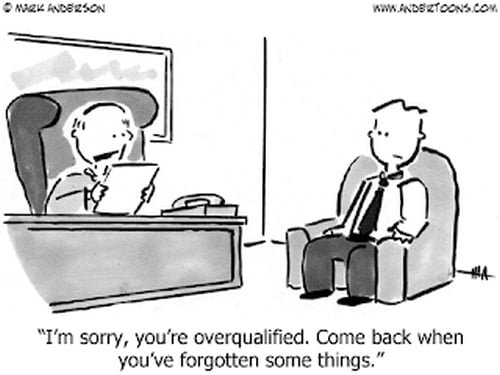Are you overqualified?
There are a number of reasons people choose to apply for jobs they are overqualified for. It might be they want a job with less stress, less hours or less responsibility. Parents returning to work might prefer to ease themselves back into the workforce, high-flyers who have climbed the corporate ladder might want to take a backseat, or an academic could have a desire to broaden their experience.
Applying for jobs for which you are overqualified can be a challenge since employers might make assumptions about you and your suitability for a role. Some assumptions could include:
- your salary expectations will be too high
- you won’t stick around, only staying until something better comes along
- you will be a threat to others in the organisation with less qualifications, skills and/or experience
- you’ll want to make unwelcome changes
- you will be after their job
Here are some ideas for overcoming these assumptions:
Salary
Be clear about your salary expectations. If you are willing to work for a lot less than you are used to earning, make it clear that you are aware of the salary range and that it suits your requirements.
Demonstrate your interest
Explain why you want the job and how it fits in with your personal and career goals. If it’s less responsibility you’re looking for, communicate this in the personal statement section of your CV, in your cover letter and at the interview.
Show your fit for the role
It’s important to tailor your CV for each role you apply for. Demonstrate your fit with the role by focusing on the key skills, personal attributes and other requirements. Are they looking for a minimum 5 years’ experience in similar role? Someone with experience in a particular market? Use a bulleted list to help the reader quickly see you match to the role.
Remove unnecessary information
If you have qualifications you fear make you appear overqualified, consider removing these when applying for lower level roles. Likewise, when describing your previous roles, play down your skills by only including those that match the role.
This is not an easy task since traditional CV writing guidelines encourage you to include as many related qualifications, skills and experience as possible. The best way to decide what to leave out is to ask yourself: “Will including this information hurt my chances of being considered for this role?” If the answer is yes, then leave it out.
Be clear about what you want and be ready to communicate this through your CV, cover letter and at the interview.
Reducing your threat
In addition to adjusting the content of your CV as described above, you should be prepared to alleviate any fears during the interview.
Think about how you will answer questions about your background that will demonstrate your genuine interest in the role and willingness to perform the stated duties. Practice answering questions that may challenge your suitability due to being overqualified.
Whatever your situation, be clear about what you want and how the role you’re applying for fits in with your goals.

Lisa LaRue, MCareerDev, RCDP, MAC
Career & Executive Coach | Career Development Consultant | EMCC-Accredited Master Practitioner Coach (EIA) and Coach Supervisor (ESIA) and CDI-Registered Career Development Professional (RCDP) with over 20 years’ experience helping achieve successful and fulfilling careers. With a passion for human flourishing, Lisa is also a part-time doctoral researcher of flow, performance and wellbeing at work.






